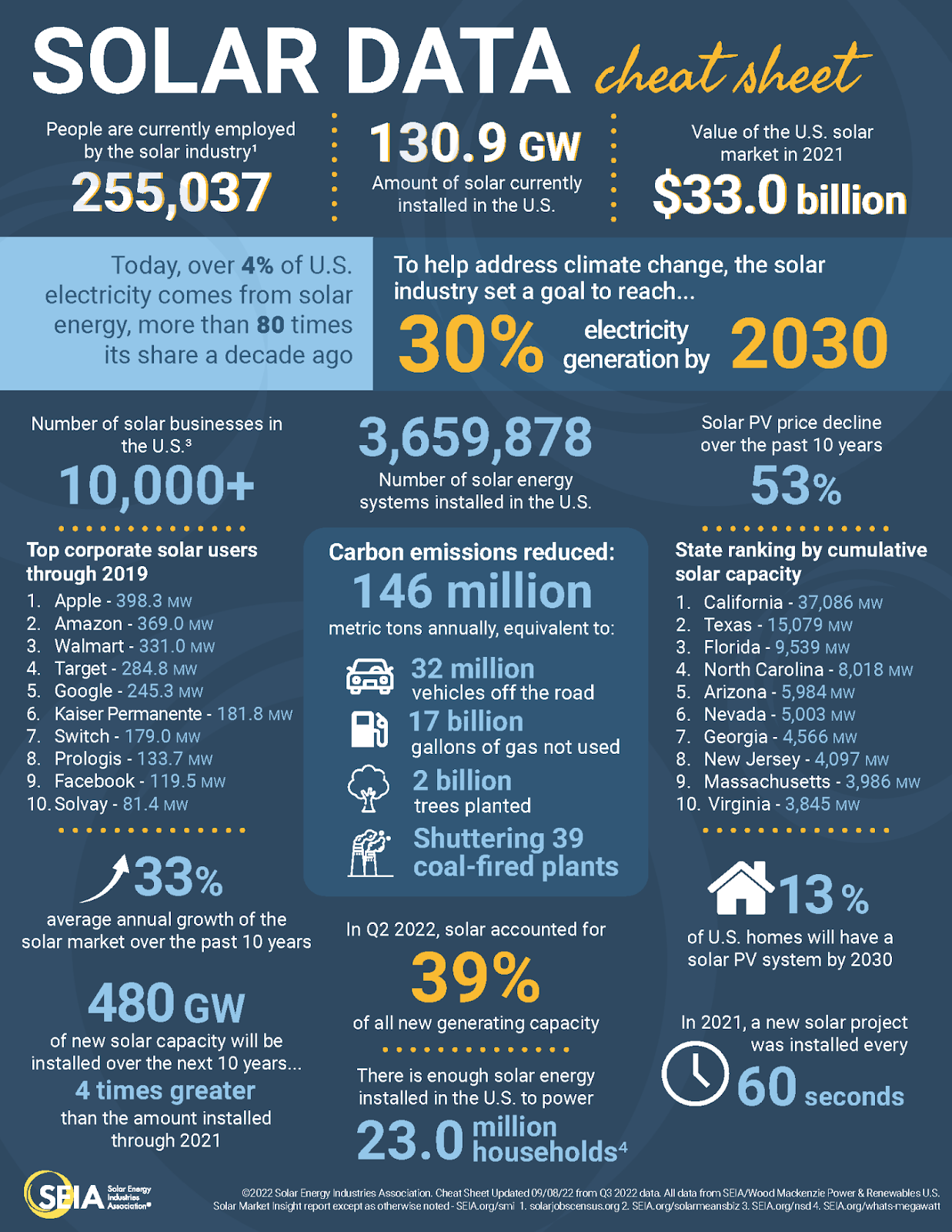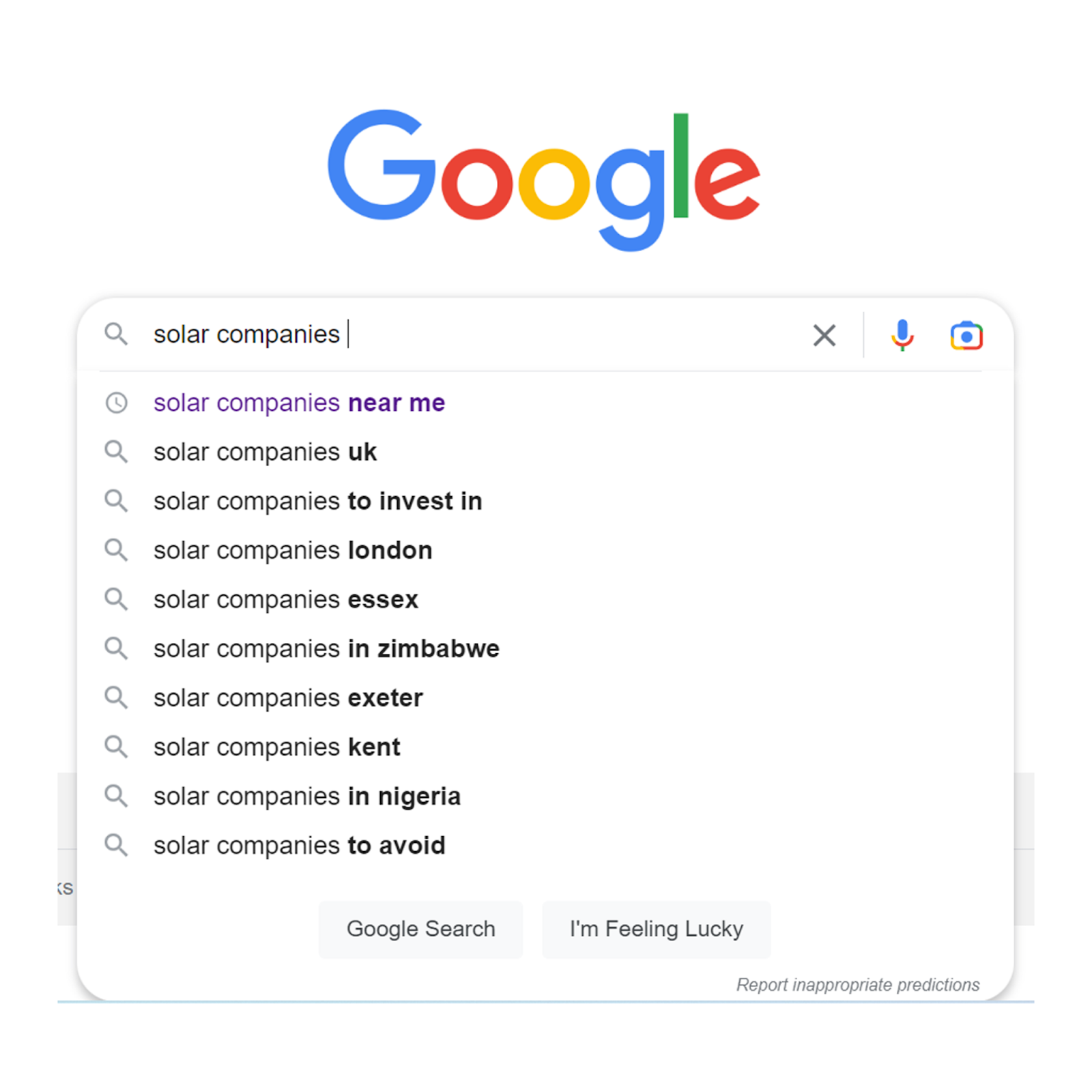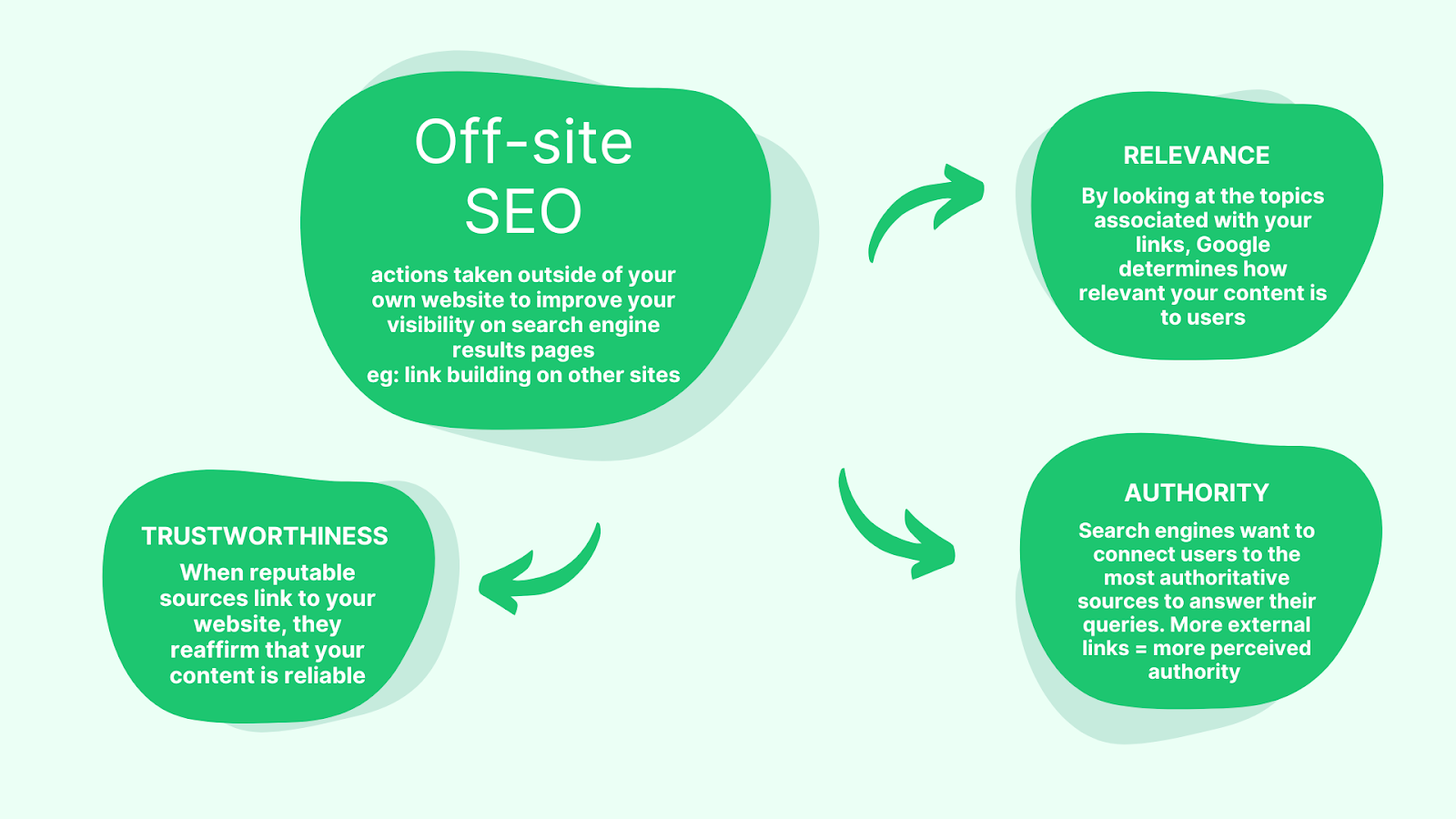An SEO Guide For New Solar Companies (And How to Nail it)
Solar power is growing in popularity - in 2021, a new solar project was installed in the USA every 20 seconds. A quick scan of the stats below will tell you: the demand for solar energy is only going up.

Image sourced from SEIA research
While increased interest in sustainable energy systems is great news for the planet, it might seem daunting if you’re a new solar company looking to successfully start a business in an increasingly competitive market.
How can you set yourself apart from the competition, be seen by the right people, and acquire valuable leads?
Getting quality leads is already quite difficult in the solar industry. A traditional lead funnel is a lengthy process, drawing customers in with low-barrier-to-entry offers, before upselling to larger purchases.
This does not work in the solar industry.
A residential customer will only need your services once every 20-30 years, and a renewable energy system is a sizable investment.
So, you need to be the go-to provider when they make this decision. While you’re not going to dominate the market nationwide straight away, you can certainly build up a niche for yourself to stand out from the crowd.
Shortcuts:
The way to do this is to embrace the power of Search Engine Optimization (SEO). This just means implementing strategies to get your business to rank higher in Google search results (sometimes called Search Engine Result Pages, or SERPs).
How often do you find yourself scrolling through the second or third pages of search results when you’re looking for answers on Google? Chances are, you only venture to these pages if you’re truly desperate. It’s the same for your potential customers.
If your solar company doesn’t show up nice and early on relevant Google searches, you’re likely to get overlooked.
Before we get into the specifics of how to use SEO to your advantage, let’s take a look at what the benefits might be.

Screenshot taken by author
How can SEO benefit my business?
1) Building brand credibility and awareness
Again, which website would you trust more? The top result for “Solar Companies near me”? Or a rogue discovery from the back pages of Google? SEO strategies establish your company as trustworthy, and as an authority on all things solar.
2) Generating leads
Solar lead generation is tricky in an increasingly online world. Search engine results are pivotal in determining whether your content gets seen by your target audience or not. SEO, therefore, ensures more traffic to your website.
3) Ensuring higher conversion rates
Don’t assume that high traffic will lead automatically to high conversion rates. Utilize pain-point SEO to effectively turn users into customers.
4) Increasing revenue
SEO can help optimize cost management, gain market share, analyze and stand out from the competition, etc. Ultimately, all of these benefits come back to the same thing: making you money.
SEO tips for your new solar business
Be intentional with keywords
If you’ve done any research on what SEO is and how exactly to use it, you’ll have come across the idea of keywords. Essentially, all this means is thinking about what your customers are likely to type into google, and making sure these queries match words on your website.
Don’t just try to rank for “solar company” - this is too broad a search term and you’ll be swallowed in the competition.
You’re going to have to think more creatively. For example, you want to be a top result when someone searches ‘xxx product in xxx area’ or ‘solar manufacturer/supplier/distributor near me’.
The product categories on your website are also a great place to start when thinking of keywords.
This does not have to be an overly complicated process. Google My Business software offers a keyword planning tool, as well as multiple ways to monitor and track progress.
Additionally, you can get inside the mind of a potential customer by googling solar companies yourself. The autofill suggestions on Google will give you a good idea of what search terms are most regularly used.

Screenshot taken by author
Once you’ve decided on your optimal keywords, what should you do with them? Flooding your site with them is not the answer. Keyword stuffing, as it is sometimes known, is considered bad practice in SEO, as it makes it look like you’re trying to trick Google’s algorithm rather than producing quality content.
For the best results, keep your keywords to four main areas:
- The page title
- The meta title
- Headings
- Alt tags on images
Don’t forget: User Experience impacts SEO
A common mistake new businesses make is getting too caught up in keyword stuffing and failing to recognize that your website needs to be well-built. Your site is in many ways a digital business card: it should be slick, professional-looking, and informative.
A technical SEO audit will highlight potential issues, such as broken links, site speed problems, and duplicate content issues.
Consider a site redesign, focusing on changes that will reduce the site’s bounce rate. Aim for a page speed below 3 seconds. Make sure everything runs just as smoothly on mobile as via laptop.
All of this is important because user experience (UX) affects your SEO ranking. If your website is frustrating to use, lacks intuitive design, and does not encourage visitors to stay on your site, then you will be ranked lower in SERPs.
Use content marketing for SEO
As well as being technically sound, a good, high-ranking website should also contain quality content.
To stay competitive, your website should be updated with fresh content at least once a week. Regularly adding new content improves search engine ranking.
While customers do google things like “solar companies in [city]”, they will also search queries, like “how does solar energy work”, “is solar energy renewable”, or “will solar work on my home”.
You want to make sure that these searches also lead to your company. The best way to do this? Start a blog section on your website.

Free to use image taken from Pixabay
A blog is a great way to get key words onto your site - but again, it’s not about spamming. With informative articles you can answer questions that readers are likely to have about solar. This positions your company as an expert on the subject. Then, when they are ready to buy, the customer will remember you as the brand which solved their problem.
Quality website content is important for every type of customer. For residential customers, who find your company while doing research online, the website is their first point-of-contact with your business.
Hone your content so that not only will they definitely find your site in the search engine, but they will also have a positive impression when they do.
Then there are commercial customers, who have already heard about your company - either via referrals from friends and colleagues or from interactions with your on-the-road sales team. When they come to your site, they already have a (hopefully positive) idea in their head about your company.
Make sure that the content they are greeted with reinforces this idea, rather than working against you.
When producing content, decide whether you’re going to focus on content flooding or content promotion. The former involves producing a high volume of content, while the latter focuses on making sure that existing content gets seen by more people.
Often, it’s better to focus on quantity rather than worrying about perfection - you’ll find your voice and nail the keywords the more experience you get.
Protect your online reputation
Off-site SEO refers to all actions taken outside of your own website to increase brand visibility on SERPs.

Image created by author
Comparison sites, reviews, and other content linking back to your website increases your credibility in the eyes of Google’s algorithms. You should therefore treat these external sources with the same care as your own website.
Review sites likely get more traffic than any solar company’s site can compete with. Many users will go straight to these sites to compare installers, so your presence on these sites needs to be carefully curated.
Fully develop any review site listings. Make sure your business profile is complete with key-word rich descriptions, sharp and creative copywriting, proper categories and service areas listed.
Reviews can be leveraged for SEO and for Conversion Rate Optimization (CRO), so try to get as many as possible. Consider Gmail automations to send out automated emails when customers reach a certain stage in your sales cycle and may be ready to provide feedback.
Once you start receiving reviews on third-party sites, it’s good practice to respond to all of them (whether they’re positive or negative). This kind of interaction reflects well on your solar business.
Additionally, be sure to make it as easy as possible for customers to get in contact about your services. Get a toll-free number and display it prominently - both on your own site and any profiles elsewhere.
Build up internal links as well
You don’t have to rely exclusively on external sources to create links to your content. Look at your online content, especially your blog, and find opportunities to create links to your other pages.
This is called internal linking. It is useful because it lends credibility to your receiving page, possibly increasing its ranking and visibility. Furthermore, internal links give your readers a chance to learn from your website, understand the topic in depth, and spend more time on your page.
Reduce the chance of visitor bounce and prove yourself as a leading expert in solar energy at the same time!

Free to use image taken from Pixabay
Understand how Google localizes keywords
This tip might be frustrating, but understanding how the algorithm works can help you use it to your advantage.
Even if users don’t specifically search their city, or the words “near me”, Google knows to prioritize businesses that are closest to the searcher’s location. Even if your solar company could easily handle installations for an entire state or region, search results will likely favor installers who operate in the same city.
There are a few ways to work around this. Firstly, as discussed above, make sure your business has a presence on multiple websites beyond your own.
Secondly, create as many Google My Business (GMB) and local listings as possible for your physical offices, even if you only have a small presence there.
This increases your likelihood of being featured in the map pack, which typically shows up first on search engine results.
As you’re spreading your business geographically, it’s useful to get a virtual phone number which is not tied to any one particular location.
Another workaround is to create city pages. Rather than throwing your addresses into the footer, create dedicated pages on your website for each physical office location and surrounding city. These serve as great landing pages and improve your GMB listing.
To optimize these city pages:
- Include city pages within a dropdown in your navigation menu. The fewer clicks between pages, the better.
- Include your company name, address, and local phone number. Software like virtual PBX with Dialpad can help to manage communication channels and ensure consistency.
- Embed a GMB location map.
- Include the city name in the title, meta description, and first heading.
- List all nearby cities where you also operate.
- Add high-quality images demonstrating the local projects and teams associated with your brand. Be sure to include alt text on these images - not only as a chance to incorporate keywords but also to make your site more accessible to screen readers.
- List the hours of operation. During these hours, make sure to have an active virtual auto attendant streamlining users toward the appropriate locations and departments
- Link to review sites.
Final thoughts
Now armed with a comprehensive knowledge of how SEO concepts apply to your solar business, you may be wondering about cost and results.
Many sites will advise you to hire an SEO expert and let them handle your digital marketing strategy from start to finish. While you focus on your area of expertise (renewable energy sources), your employee can take care of delivering SEO content, fixing technical errors, researching keywords and optimizing your website.
This is not a cheap service. Average starting prices are around $2000 per month - though arguably, the increase in sales will counteract the cost. You should start seeing results fairly quickly.
The improvement in user optimization will be evident within days. Within weeks your keyword-optimized pages should start ranking, and you can expect to see increased leads and traffic in a few months.
Equally, many of the tips listed in this article can be implemented for free - see what works for your business and use these SEO tips to your advantage.
Bio:
Grace Lau - Director of Growth Content, Dialpad
Grace Lau is the Director of Growth Content at Dialpad, an AI-powered cloud communication platform for better and easier team collaboration. She has over 10 years of experience in content writing and strategy with features like dual phone numbers in Dialpad. Currently, she is responsible for leading branded and editorial content strategies, partnering with SEO and Ops teams to build and nurture content. Grace has also written for other domains such as Codemotion and Bplans. Here is her LinkedIn.
